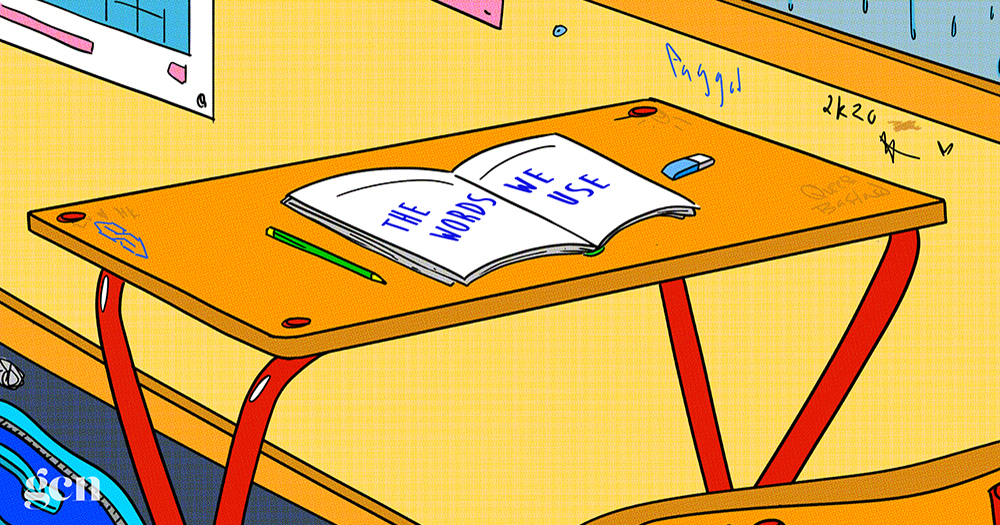GCNnewvoices in partnership with BeLonG To will platform the opinions and thoughts of LGBTQ+ young writers from across the country, speaking about issues that matter to them. Ian O’Neill talks about how homophobic language is being normalised in school.
Language has really had a rough time in recent years. Words are being cut down and names are changing. More than that, the strength of words is declining rapidly.
In a small all-boys school, we’re only allowed out two days a week to avoid crowding outside. Without a canteen or general meeting point, we’re locked into the seats of a classroom for 40 minutes of lunch. This particular day, we were finding great enjoyment launching a crunched foil ball around the room when this one guy asked me which guy I’m most likely to screw in here. He knows full well I’m bi and everyone else is straight. He knows full well but means no harm.
This casual homophobia is the bread and butter of a lot of the conversations here. One can’t communicate long without the introduction of a “You massive faggot” statement or a “You queer bastard” or one of the many racial/sexual slurs. People laugh, the conversation carries on. Homophobic bullying is ‘unheard of’ in our school. Nobody wants to hurt someone for their sexuality or gender here. People provoke instead, safe from any possibility of being labeled a bully.
There are a few theories for why this behavior is common among students today. CJ Pascoe suggests that homophobic designations are a way of asserting masculinity. The insult is then used more for gender expression than sexuality. The boys he studied associated straight masculinity with strength and prowess.
Amelie Francisco studies a wider range of slurs in secondary schools. She argues that by ignoring casual homophobia, it opens the avenue to more serious cases and bullying. It raises a barrier of communication and polarises members of the LBGTQ+ community.
That guy who asked me which student I was most likely to screw, he didn’t get an answer. There aren’t any real answers to those questions. I can’t report him, because what he said can’t be defined as bullying. Though even if it was meant to hurt or unsettle me, I’d have to wait until he did it again to define it as such. We aren’t allowed to report a bully until they act twice.
One might argue that the loss of certain words from casual conversation is a breach of freedom of speech. I’m only arguing their misuse. One is still free to use homophobic words, but one must face the consequences and not expect a casual response from a derogatory statement. The vocabulary of young people is shrinking with each year, and as such, expression is mutating. Taboos are commonplace; the universal answer of How are you? equates to grand; and nobody knows what A.D stands for anymore. The words we use today are changing slowly: soon casual homophobia will be gone outright. Something else will have taken its place.
Until students in secondary schools drop the casual use of derogatory words and homophobic and racist language, there can’t be a stable community.
Keep up to date with #GCNnewvoices across all our social media.
© 2020 GCN (Gay Community News). All rights reserved.
Support GCN
GCN is a free, vital resource for Ireland’s LGBTQ+ community since 1988.
GCN is a trading name of National LGBT Federation CLG, a registered charity - Charity Number: 20034580.
GCN relies on the generous support of the community and allies to sustain the crucial work that we do. Producing GCN is costly, and, in an industry which has been hugely impacted by rising costs, we need your support to help sustain and grow this vital resource.
Supporting GCN for as little as €1.99 per month will help us continue our work as Ireland’s free, independent LGBTQ+ media.

comments. Please sign in to comment.